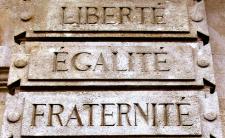1958 Constitution
France’s current republic, the Fifth Republic, was established with the adoption of a new constitution on October 4, 1958, with direct presidential elections introduced in 1962. The Constitution of the Fifth Republic strengthened de Gaulle’s powers as head of state at the expense of parliament and the judiciary. The Constitution also draws inspiration from the first French Constitution, and incorporates the Declaration of the Rights of Man and the Citizen by a reference in its preamble.
The Executive
France has a semi-presidential system. The President is elected by universal suffrage for a five year term, and may serve no more than two consecutive terms (down since 2002 from the previous no-limits seven year term) using a two-round majority system: if no candidate receives an absolute majority of the vote, a second round takes place between the top two vote-getters from the first round. To take part in the election, candidates must obtain 500 sponsoring signatures of elected officials from at least 30 departments or overseas territories.
The President is head of state and supreme commander of the military, and chairs the cabinet.
The Council of Ministers
The President appoints the Prime Minister, who nominates the other ministers for appointment by the President. The Prime Minister and cabinet can only be removed by the National Assembly, to which they are collectively responsible. As the National Assembly has tended to have a majority belonging to the President’s party or coalition, the President and the Prime Minister have tended to come from the same political party. Sometimes, however, the National Assembly has been controlled by the party opposing the president, leading to a divided executive where the President and Prime Ministers came from different parties. This is called cohabitation. There have been three periods of cohabitation, lasting a total of nine years. While the President retains an independent power in determining foreign policy, all domestic decisions made by the President must be approved by the Prime Minister. Cabinet ministers determine policy and put new legislation before parliament. In practice, the Presidents exerts a great deal of influence over a cabinet of the same political colour, including the effective power to dismiss a cabinet, but much less in cases of cohabitation
The President has the power to dissolve the National Assembly and call new elections, but no more than once per year. He has no veto over legislation, although he may return a bill to parliament for reconsideration; if passed again, the bill must be promulgated as law. The President may be removed by Parliament sitting as the High Court (impeachment) for “a breach of his duties patently incompatible with his continuing in office”. This process is initiated by one house, with the other house issuing a ruling by secret ballot, in which a two-thirds majority is necessary for a removal. On the request of the Prime Minister or both houses of parliament, the President may call a binding referendum on many issues. In practice, presidents have been able to call referenda without such request, as the Constitutional Council held the results to be valid under the principle of popular sovereignty.
The Legislature
The French parliament is bicameral, consisting of the Senate and the National Assembly. The National Assembly is elected by universal suffrage for a five-year term. It currently consists of 577 Deputies elected (according to the electoral law) from single-seat districts by two-round plurality: if no candidate received a majority of the votes in the first round, any candidate which received votes equivalent to at least 12.5% of registered votes may take part in the second round, in which the candidate with most votes wins. A candidate for an election must be a citizen, have attained the age of 18 years, be qualified to vote, not be ineligible by dint of a criminal conviction or judicial decision, and have a bank account.
The Senate is elected indirectly by electoral colleges for each department (district), consisting of a total of more than a hundred thousand councilors from the different levels of local government. The electoral system is proportional in departments with three seats or more, but majoritarian in departments with one or two seats. The departments are divided into two classes, so that half of all Senators are elected each three years, for a term of six years. Originally, Senators served nine-year terms but this was reduced to six in 2004.
The National Assembly is far more powerful than the Senate. When there is disagreement between the two houses, the government calls a conference committee of representatives from both houses. If one of the houses rejects the committee’s compromise proposal, or a compromise cannot be reached, the government can ask the National Assembly to make the final decision. The government is quite dominant over parliament, having other considerable powers over the legislative procedure, including when debate ends on a government bill and which amendments are debated. It can also make a finance or social security financing bill into a confidence vote, which is considered to have passed the National Assembly unless the government is voted out by a non-confidence vote. Furthermore, if parliament does not reach a decision on a finance bill or a social security financing bill within 70 or 50 days, respectively, the government is empowered to pass such legislation by decree. The autonomy of parliament is also restricted, as each house is not allowed to form more than eight committees.
The Judiciary
There are multiple final courts in France, each with its own jurisdiction. The Court of Cassation hears appeals on criminal and civil cases; the Council of State hears administrative appeals; a jurisdictional court decides in case of conflict between the civil and administrative systems of justice. The Court of Cassation and Council of State each consist of more than a hundred judges, who hear different kinds of cases in small panels. The Council of State also has an advisory role, reviewing government bills before they are submitted to parliament as well as decrees and delegated legislation. Judges are appointed to the Court of Cassation by the Conseil Supérieur de la Magistrature (Supreme Council of the Judiciary), which is also in charge of disciplining judges. The Supreme Council consists of the President of the Republic (presiding), the Minister of Justice (as vice-president), four judges and four legal department lawyers (one in each group appointed by the President of the Republic, the President of each House of Parliament, and one elected by the assembly of the Council of State), and six judges and six legal department lawyers elected by their colleagues to represent each of their ranks; the president and vice-president are ex-officio, the others serve for a renewable four-year term. The Council of States consists of various members: most are appointed based on competitive examinations, some are appointed by the President of the Republic, and others appointed by the government. Cases of misconduct by ministers are heard in the Court of Justice of the Republic, which consists of six parliamentarians elected from each house and three judges of the Court of Cassation.
The Constitutional Council handles constitutional issues. It consists of nine regular members who are appointed by the President, the President of the Senate, or the President of the National Assembly every three years for a nine-year, non-renewable term. In addition, former Presidents of the Republic are also members of the Constitutional Council, by right (currently there are three such members). The Council must confirm ex ante the constitutionality of all organic laws before promulgation, as well as regular laws challenged by the President, the Prime Minister, a president of one of the houses, 60 Senators, or 60 Deputies. Constitutional amendments in 2008 extended the powers of the Council to review the constitutionality of laws after their promulgation when a case concerning fundamental rights arises in the context of court cases.
Constitutional amendment procedure
A constitutional amendment can be proposed by the President on advice of the Prime Minister or by members of parliament. It must be passed by both houses of parliament sitting separately and ratified by referendum. If the amendment is a government proposal, it may be ratified by a three-fifths majority of a joint session of parliament.
System of Government under the 1958 Constitution
Bibliography
- http://www.senat.fr/
- http://www.conseil-etat.fr/
- Ordonnance n° 58-1270 du 22 décembre 1958 portant loi organique relative au statut de la magistrature. (Version consolidée au 12 février 2016)
- Le recrutement et l’avancement des juges français. JY McKee. 2007
- Tsebelis & Money. Bicameralism. 1997
- Shugart, Matthew, and John Carey. Presidents and Assemblies. 1992.
| Branch | Hierarchy | Appointment | Powers | Removal |
|---|






Share this article